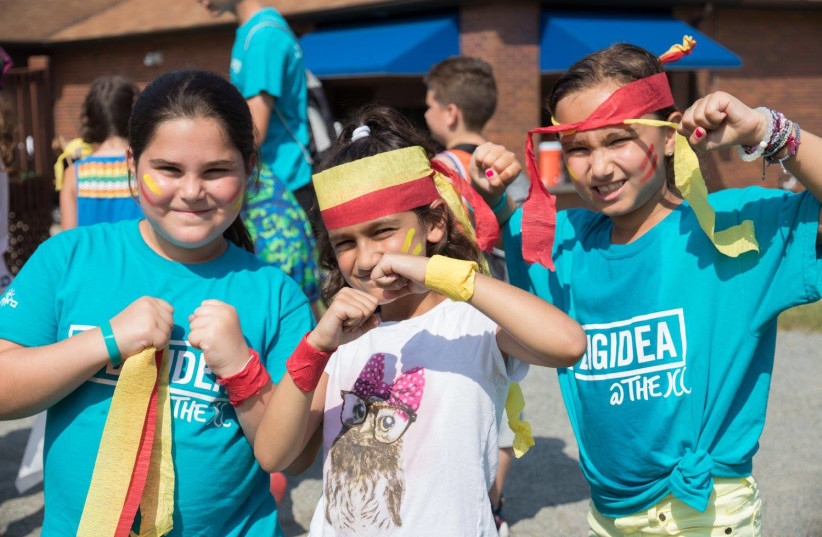Summertime is almost here and that means the summer camp season is fast approaching.
For the Jewish community in North America, the summer camp experience is almost de rigueur. Whether it’s for two weeks, a month or even two months, Jewish North American elementary school-aged children and teens attend summer camp. When the campers age out, many stay on as counselors and staff.
Bugs that bite, lumpy mattresses and unruly bunk mates aside, for most kids, summer camp is a fun experience. For parents, it’s a welcome respite. A time to sample empty nest syndrome well before the kids are off to college.
As wonderful as all summer camps are, Jewish summer camps offer an added dimension to the life of a child. They help imbue the child – body and soul – with a sense of Yiddishkeit that can only be experienced in a place where you spend your days running free with friends you only see every summer, evenings are spent in activities that entail no homework, there is communal dining and raucous singing.
Jewish summer camps have been around for over 100 years. Studies show that they are one of the three most important and impactful factors in the Jewish development of a child.

Findings show the first factor is Jewish day school, the second is an Israel experience and the third is Jewish camps.
Those findings are easy to understand, certainly for the very many people who have attended Jewish camps – more specifically Jewish sleep-away camps, but even Jewish day camps. The recipe for success is simple: Put groups of young impressionable people with mostly shared values together, and add exciting, dynamic, enthusiastic and young educators. Through games and stories, songs and dance, help them explore their Jewish life. Throw in a campfire and roasted marshmallows, and voila: you’ve created a positive, fun, doable Jewish experience. An experience that lasts a lifetime.
What do you learn?
In summer camp, you learn about Judaism in fun ways. Even Jewish camps that do not have set curricula have Jewish content. Campers learn friendships are born and maybe even the spark of first love.
What synagogues cannot do in 10 months during the year, happens easily during the two summer months spent in the great outdoors.
Summer camps may have been perfected by Jews, but they did not begin with Jews. They began with a man named Frederick W. Gunn, in Gunnery, Connecticut, just after the Civil War. Gunn was an abolitionist and created the first camp for boys.
After the Civil War, there was a mass movement toward city and urban life and industrialization. One of the negative consequences of that urban industrial movement was that young people spent too much time indoors. In response, Gunn established a camp to get young men back outdoors.
It was a good idea, so others followed suit.
Then, as of now, there were camps for the wealthy and camps for the urban poor. The general consensus was that the cities had poor air quality and poor water, and young people needed to go to the country for the summer.
Summer camps became a burgeoning industry. There were fresh-air camps, YMCA Christian camps, sports camps, drama camps, camps to lose weight and of course, Jewish camps.
Before 1900, there were about 100 camps in the United States. By 1910, there were 1,000 and the numbers just ballooned. In 1910, the American Camp Association was established. The Association gave accreditation to summer camps based on certain standards. The standards included health and safety, as well as the structure and regimented days and staffing.
Jewish ideological camps started in the 1920s. All kinds of camps – Zionist camps, Yiddish camps, socialist camps, communist camps and even anarchist camps. In 1941, Camp Massad was established in the Pocono Mountains as a Hebrew-speaking, Zionist, Orthodox camp. It was so popular that within years, the original Massad became Massad Aleph and then came along Massad Bet and for a few years, even Massad Gimmel.
My grandfather-in-law was instrumental in starting that camp. A master wordsmith, when he first toured the location and decisions had to be made about whether or not to purchase the land for the camp, he punned and said, in Hebrew, of course – po kinu, meaning here (in the Poconos) is where you should buy.
Another push for Jewish camps came after the Holocaust. In 1947, the Conservative Movement opened Camp Ramah in Wisconsin. The Reform Movement quickly followed suit and in 1952, they opened their first camps.
I spent over two decades at summer camp. I began as a camper, but most of those years were spent as an educator. They were transformative years.
There is little doubt that summer camps successfully mold the Jews of the future. The informal educational environments that are created and that saturate almost every activity, the religious life and Jewish values that are imbued into every camper remain part of camper’s lives forever. And to be perfectly honest, where else but in summer camp would a Jewish kid ever learn to shoot a bow and arrow.
Like Hogwarts, summer camp has magic. Each camp has its own language. Each camp has its own secrets. In Jewish summer camps we have an added dimension, it’s called tradition – Jewish tradition.
The writer is a columnist, and a social and political commentator.
